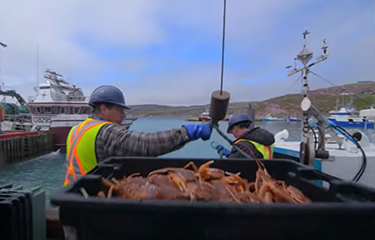The Fish Food and Allied Workers Union (FFAW), representing harvesters in Newfoundland and Labrador, Canada, said they still have a list of five outstanding grievances filed by and against the union after the difficult snow crab season.
The 2023 snow crab season started off with a complete collapse in price – resulting in members of the FFAW vowing they wouldn’t fish at the “unsustainable” price. What followed was a six-week standoff between harvesters and the Association of Seafood Producers (ASP) that saw quota left in the water as fishermen stayed at the dock.
The stalemate ended after the FFAW and ASP reached a deal, but the FFAW said in a recent update that the union still has a list of inshore grievances that need to be resolved before 2024 price negotiations begin.
The first grievance is an ongoing one that started when the FFAW claimed processors decided to unilaterally drop a 20 percent tolerance rule for smaller sized crab. Since 1998, harvesters and processors have agreed to a 20 percent tolerance for crab under four inches – crab that fetch a lower price, to avoid the practice of “high-grading.” High grading consists of fishermen throwing out legal crab of smaller sizes to maximize their profits.
In June, the FFAW said processors were ignoring that long-standing 20 percent tolerance. The FFAW said it has filed a grievance about the issue, with a hearing scheduled for 12 February.
The next grievance is over trip limits and scheduling, which the FFAW claims was unfairly forced on crab harvesters as “processors claimed they could not deal with the amount of product coming ashore.” The FFAW said that under the Master Collective Agreement processors are required to notify the union any time that they are unable to handle an oversupply – but that didn’t happen.
The third grievance is from the ASP against the FFAW. That grievance is related to the stalemate over crab fishing, with the ASP alleging the FFAW led and authorized individual fish harvesters to refuse to participate in the 2023 snow crab fishery.
The last two grievances are outstanding from 2022. One, the FFAW said, is related to the failure of processors to abide by currency provisions provided on the crab schedule. The second is unrelated to snow crab – the FFAW claims that there were miscalculations of water deductions in sea cucumber harvests.
The FFAW is pushing for discussions on the grievances before the FFAW and the ASP start the price negotiation process. Prices in Newfoundland and Labrador are set by a price-setting panel – and in the past two years, the panel has had to deal with competing proposals and calls for changes in management and multi-week fights over the price.
“We cannot start 2024 price negotiations and the fishing season with unresolved disputes from last season,” The FFAW said. “Decisions on these grievances stand to have significant impacts on fish pricing and must have a timely resolution.”
Photo courtesy of the Government of Canada







